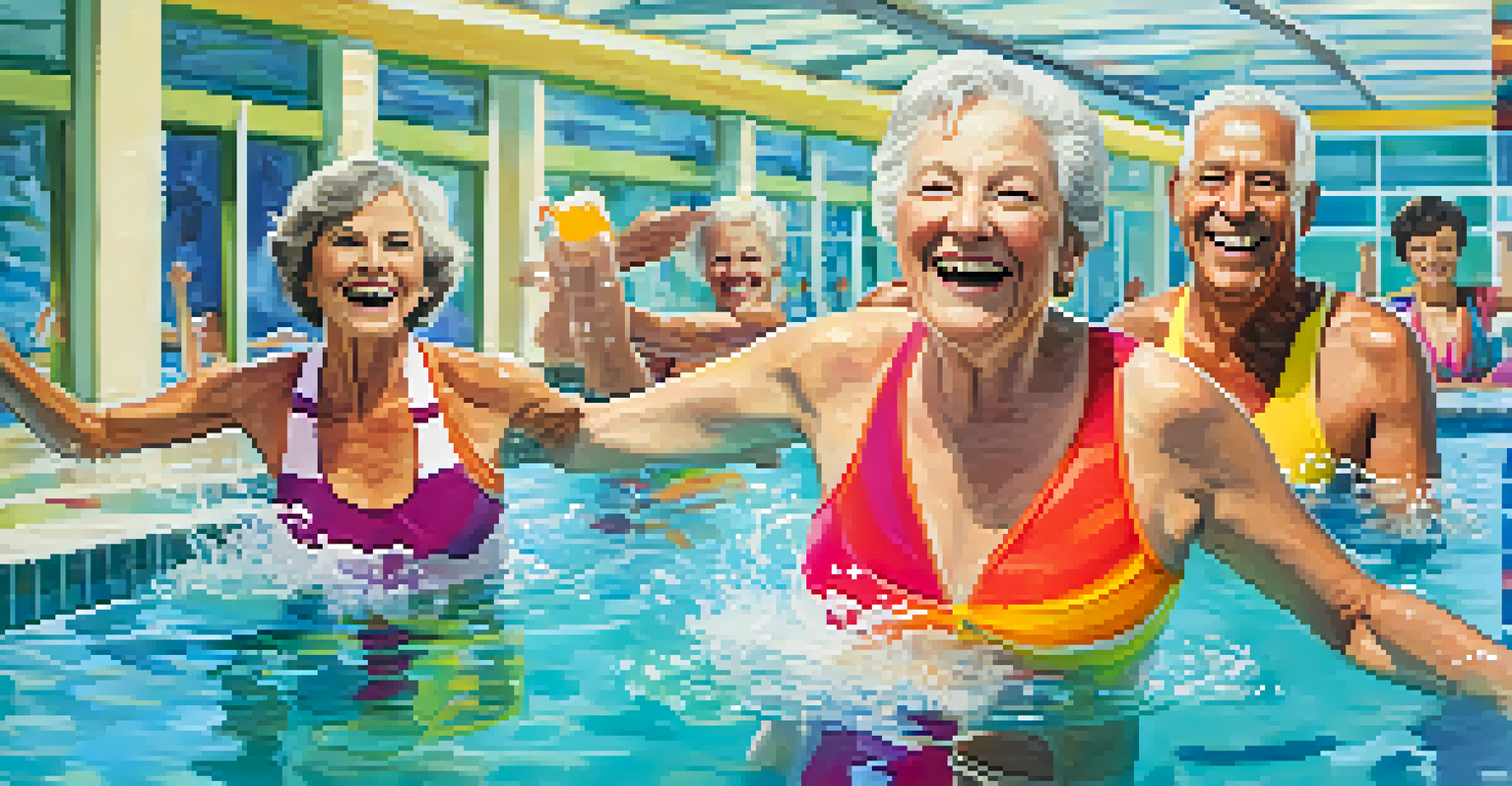Importance of Hydration for Older Adults' Health

Understanding Hydration and Its Importance
Hydration refers to the process of providing the body with adequate fluids. For older adults, staying properly hydrated is often overlooked, yet it is vital for maintaining overall health. As we age, our bodies lose some of their natural ability to retain fluids, making it even more important to prioritize hydration.
Water is the driving force of all nature.
Dehydration can lead to a range of issues, including kidney problems, urinary tract infections, and even confusion. It’s essential for older adults to recognize the signs of dehydration, such as dry mouth or fatigue, which can easily be mistaken for other health issues. By understanding the importance of hydration, seniors can take proactive steps to safeguard their health.
Additionally, staying hydrated can improve physical performance and cognitive functions. This means that older adults can enjoy their daily activities more fully, from gardening to playing with grandchildren, simply by ensuring they drink enough water.
How Dehydration Affects Older Adults
Dehydration can profoundly affect older adults in various ways. One of the most alarming effects is cognitive decline, which can manifest as confusion or memory problems. When the brain doesn’t receive enough water, it struggles to function optimally, impacting daily life and overall well-being.

Physical health is also compromised; dehydration can lead to muscle weakness and joint pain, making it difficult for seniors to stay active. This can create a vicious cycle, as decreased activity can further contribute to dehydration, leading to a decline in health. Understanding these risks is crucial for older adults and their caregivers.
Hydration is Vital for Seniors
Staying properly hydrated is crucial for older adults to maintain their health and prevent issues like confusion and kidney problems.
Moreover, dehydration can exacerbate chronic conditions such as diabetes and heart disease. Therefore, maintaining adequate hydration is a simple yet effective way to manage these conditions and promote better health outcomes.
Signs of Dehydration to Watch For
Recognizing the signs of dehydration is crucial for older adults. Common symptoms include dry mouth, dizziness, and reduced urine output. If you notice any of these signs, it’s important to take action quickly, as dehydration can escalate rapidly.
The body is like a garden, and hydration is like the water that keeps it blooming.
Another telling sign is the color of urine: dark yellow or amber indicates dehydration, while light yellow suggests proper hydration. Encouraging seniors to monitor their fluid intake can empower them to take charge of their health. They should aim for at least 8 cups of water a day, though individual needs may vary.
Additionally, it's helpful to note that some medications can contribute to dehydration. Older adults should discuss their medications with healthcare providers to understand how they might impact hydration levels.
Tips for Staying Hydrated
Staying hydrated doesn't have to be a chore; small changes can make a big difference. One practical tip is to carry a water bottle throughout the day, making it easier to sip regularly. Setting reminders on a phone or using apps can also help keep hydration at the forefront of daily routines.
Incorporating water-rich foods into meals is another effective strategy. Fruits and vegetables like cucumbers, watermelon, and oranges not only hydrate but also provide essential nutrients. This makes hydration a delicious and enjoyable aspect of a balanced diet.
Recognize Dehydration Signs Early
Common signs of dehydration in seniors include dry mouth and dizziness, making it essential to monitor hydration levels regularly.
Lastly, seniors can explore herbal teas or flavored water options for variety. This can enhance the appeal of drinking more, making hydration feel less like a task and more like a treat.
Hydration and Physical Activity
For older adults, staying active is key to maintaining health, and hydration plays a vital role in this. When engaging in physical activities, the body loses fluids through sweat, which must be replenished for optimal performance. Taking a few sips of water before, during, and after exercise can help keep energy levels up.
Hydrated muscles also perform better, which can reduce the risk of injury. When muscles are well-hydrated, they are more flexible and less prone to cramping. Thus, for seniors who are concerned about staying active, maintaining hydration is a simple yet powerful tool.
Moreover, staying hydrated can enhance recovery after physical exertion. This means that older adults can bounce back more quickly from activities, allowing them to enjoy their favorite hobbies more frequently.
Social Aspects of Hydration
Hydration can also provide social benefits for older adults. Sharing drinks with friends during gatherings or participating in group activities centered around health can create a sense of community. This social interaction can enhance the overall hydration experience and make it more enjoyable.
Engaging in activities like water aerobics or group walks not only encourages hydration but also fosters relationships. These social connections are vital for mental health, reducing feelings of loneliness that many seniors experience.
Socialize to Encourage Hydration
Engaging in social activities centered around hydration can foster community and improve mental health for older adults.
Furthermore, family members can play a key role by encouraging hydration habits. Simple actions, like inviting older loved ones for a drink or preparing hydrating meals together, can strengthen bonds and promote health.
Consulting Healthcare Providers about Hydration
Older adults should not hesitate to discuss hydration with their healthcare providers. A healthcare professional can offer personalized advice tailored to individual health needs and conditions. This is especially important for seniors with chronic illnesses or those taking multiple medications.
By consulting with healthcare providers, seniors can develop a hydration plan that works for them. This can include recommendations for fluid intake based on lifestyle, activity level, and overall health status. It’s an opportunity to address any concerns about hydration in a supportive environment.

Additionally, healthcare providers can help identify any barriers to hydration. Whether it’s difficulty accessing water or simply forgetting to drink, recognizing these challenges can lead to practical solutions that improve health outcomes.